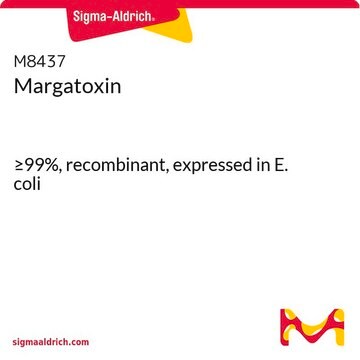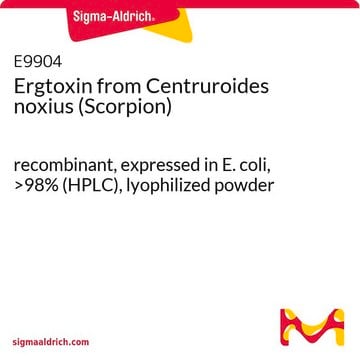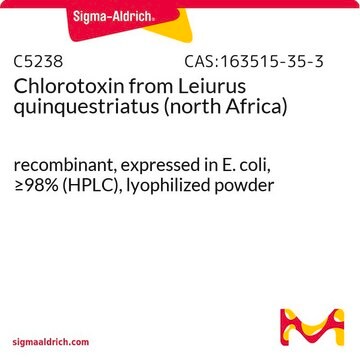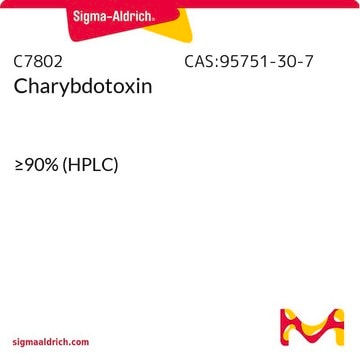V5251
Scorpion venom from Leiurus quinquestriatus (north Africa)
Synonym(s):
Deathstalker
Sign Into View Organizational & Contract Pricing
All Photos(1)
About This Item
UNSPSC Code:
12352200
NACRES:
NA.77
Recommended Products
Quality Level
storage temp.
−20°C
General description
Note: This venom is distinguishable from L.q. hebraeus (V1755) electrophoretically. This may be due in part to the presence of ToxinV in the North African venom.
Application
Scorpion venom from Leiurus quinquestriatus (north Africa) has been used to monitor stimulation levels and to test its effect on receptor responses in slowly adapting (SA) abdominal stretch receptor neurons. It has also been used to test its effect on γ-aminobutyric acid (GABA) release in the isolated synapse of crayfish.
Biochem/physiol Actions
Scorpion venom from Leiurus quinquestriatus has high levels of zinc and manganese. It elicits harmful effects and is reported to induce cytotoxicity and enhance apoptosis in cancer cell lines.
Storage Class Code
11 - Combustible Solids
WGK
WGK 3
Flash Point(F)
Not applicable
Flash Point(C)
Not applicable
Choose from one of the most recent versions:
Certificates of Analysis (COA)
Lot/Batch Number
Don't see the Right Version?
If you require a particular version, you can look up a specific certificate by the Lot or Batch number.
Already Own This Product?
Find documentation for the products that you have recently purchased in the Document Library.
Nuhan Purali
Toxicon : official journal of the International Society on Toxinology, 41(3), 383-389 (2003-02-05)
Effects of various types of scorpion venom on gamma-aminobutyric acid (GABA) release were studied in an isolated synapse in the crayfish. Post-synaptic GABA-induced currents were recorded to monitor the GABA release from the pre-synaptic site. In 20mM tetraethylammonium (TEA) chloride
N Purali
General physiology and biophysics, 21(2), 205-226 (2002-09-19)
Action potentials (APs) and impulse responses in the soma and axon of the rapidly and slowly adapting (SA) abdominal stretch receptor neurons of the crayfish (Astacus leptodactylus) were recorded with single microelectrode current-clamp technique. Impulse frequency response to constant current
AbdulRahman K Al-Asmari et al.
Journal of venom research, 7, 16-20 (2016-11-09)
Scorpion venom is a rich source of biomolecules, which can perturb physiological activity of the host on envenomation and may also have a therapeutic potential. Scorpion venoms produced by the columnar cells of venom gland are complex mixture of mucopolysaccharides
Morphology, histology, histochemistry and fine structure of venom apparatus of the medically relevant Scorpion, Leiurus quinquestriatus
Bioscience Reports, 12(2), 1274-1288 (2020)
Our team of scientists has experience in all areas of research including Life Science, Material Science, Chemical Synthesis, Chromatography, Analytical and many others.
Contact Technical Service








